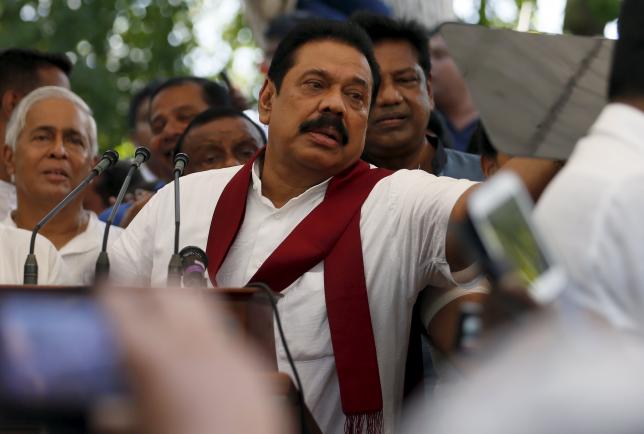Sri Lanka's ex-President Rajapaksa launches comeback bid in poll for PM
MEDAMULANA: Sri Lanka's former President Mahinda Rajapaksa, regarded as a hero by some and a war criminal by others for the brutal defeat of Tamil Tiger rebels six years ago, announced on Wednesday that he would stand in an election for prime minister next month.
The parliamentary election comes after months of deadlock in the legislature, as a six-month-old coalition government cobbled together by President Maithripala Sirisena and Prime Minister Ranil Wickramassinghe has struggled to pass key political reforms in the island state.
Together they had sought to curb presidential powers which they had accused Rajapaksa of abusing during his decade in power, and depoliticise state institutions such as the police, judiciary and public services.
Their government has only partially fulfilled its agenda, having promised to implement a reform programme during its first 100 days, and the president dissolved parliament on Friday.
Announcing his plans for a political comeback, Rajapaksa drew thousands of supporters to a rally on a Buddhist holiday in his Hambantota district constituency.
"Victory for our future prime minister," they shouted as he declared his candidacy.
When Rajapaksa lost the presidency to Sirisena in January it also cost him the leadership of the Sri Lanka Freedom Party (SLFP), as lawmakers transferred their loyalty to the new president.
Though he has not said which party will be his vehicle for the election, political analysts say Rajapaksa's candidacy risks splintering the SLFP further.
Sirisena accused him of nepotism and corruption during a bitterly fought campaign for the presidency, and he has refused to make him the SLFP's candidate for the premiership.
To defeat Rajapaksa in January, Sirisena had allied with opposition leader Wickramassinghe, and appointed him prime minister of their coalition government in return.
Rajapaksa's appeal lies among the country's Buddhist Sinhala majority, mostly rural villagers who account for about 70 percent of island nation's 21 million population. But any split in the SLFP would divide that vote bank.
Feted by many Sri Lankans for ending a 26 year civil war with a crushing victory over the Tamil Tiger rebels, Rajapaksa was slammed by rights groups for the brutal methods used. U.N. reports alleged human rights violations and sought to establish an independent mechanism to investigate war crimes during the final phase of a conflict that ended in May 2009.
Stung by Western criticism over conduct of the war, Rajapaksa had welcomed stronger ties with China, but the new government has sought a more balanced foreign policy.
During Rajapaksa's time in office the media was heavily censored, and attacks on religious minorities and persecution of political rivals and journalists were commonplace.
READ ALSO:






